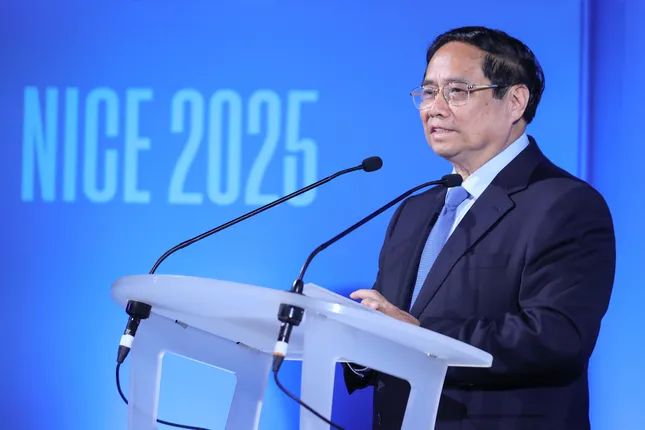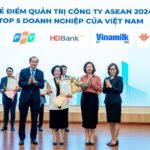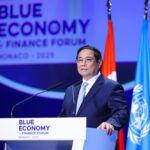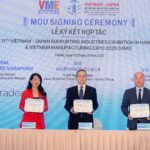Nearly 100 delegates, including leaders from delta countries such as France, the Netherlands, Thailand, and Bangladesh, and international organizations managing delta regions worldwide, attended the summit.
According to statistics from scientific studies and reports, delta regions currently account for only about 0.65% of the world’s land area but are home to nearly 4.5% of the global population and contribute approximately 6% to the world’s total food production.
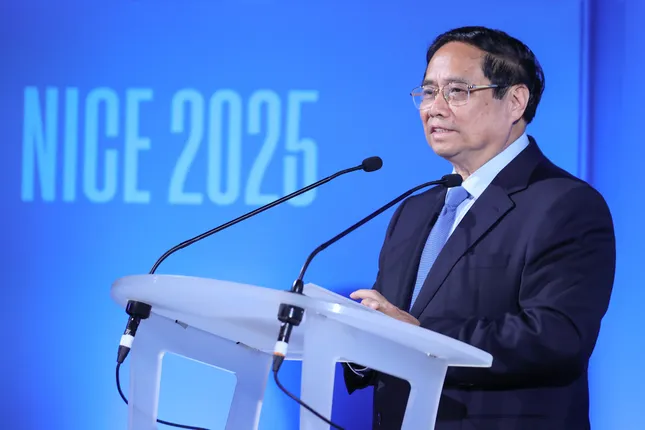
Prime Minister Pham Minh Chinh speaks at the Summit on Deltas for Climate Resilience. Photo: VGP
Prime Minister Pham Minh Chinh pointed out that delta regions are associated with multiple sources of human civilization; they are ecosystems, living spaces, transboundary water sources, and long-standing economic, cultural, and social pillars for the local people.
The Prime Minister emphasized that these fertile lands are now at the forefront of the battle against climate change, facing challenges such as rising sea levels, land subsidence, erosion, drought, salinity intrusion, loss of biodiversity, and environmental pollution. These are no longer mere warnings but harsh realities that threaten the livelihoods of hundreds of millions of people in the delta regions of the world’s major rivers.
From the perspective of a country with a large delta area, the Prime Minister stated that adapting to climate change in delta regions is not only an urgent and objective requirement but also a historical mission.
The Prime Minister also shared Vietnam’s experience based on the philosophy of “harmonizing with nature” and the criteria of “shared benefits and multiple objectives.” Vietnam has been effectively implementing synchronous strategies, policies, and solutions to: mobilize resources for infrastructure development; enhance resilience and adaptability to climate change; promote green agriculture and transform the production model of one million hectares of rice towards high productivity and low carbon emissions; strengthen transboundary cooperation and protect water resources and aquatic products, with the accompaniment and support of development partners and international organizations.
Prime Minister Pham Minh Chinh emphasized the importance of global collaboration on shared water resources, respecting each other’s interests, equality, and abiding by the rules.
In this spirit, the Prime Minister affirmed that Vietnam would continue to proactively coordinate closely with other countries and regions to achieve the dual goal of ensuring global food security and reducing greenhouse gas emissions.
To achieve this goal, the Prime Minister proposed a global, people-centric, and comprehensive approach, suggesting five strategic initiatives: long-term inter-regional and inter-sector planning for delta transformation; preservation and promotion of indigenous knowledge combined with the application of science, technology, digitalization, and artificial intelligence; enhanced international cooperation and effective connectivity within the Global Delta Alliance; establishment and implementation of equitable, inclusive, and accessible green and sustainable climate finance mechanisms; and development of flexible, reasonable, and effective norms, standards, and codes of conduct for delta regions.
Prime Minister Pham Minh Chinh reaffirmed Vietnam’s consistent stance as a good friend, reliable partner, and active and responsible member of the international community in protecting and developing delta regions adaptable to climate change.
To realize this policy, the Prime Minister stated Vietnam’s determination to be “ready in three ways”: ready to share knowledge, management experience, and initiatives; ready to participate in regional and international cooperation mechanisms and initiatives; and ready to contribute to global efforts to adapt to climate change in delta regions.
In conclusion, the Prime Minister called for global solidarity and cooperation in both vision and action to ensure that delta regions, the confluence of life between land and ocean, remain a stable foundation for the livelihoods and lives of the people and a precious gift of nature for the enduring prosperity of nations worldwide.
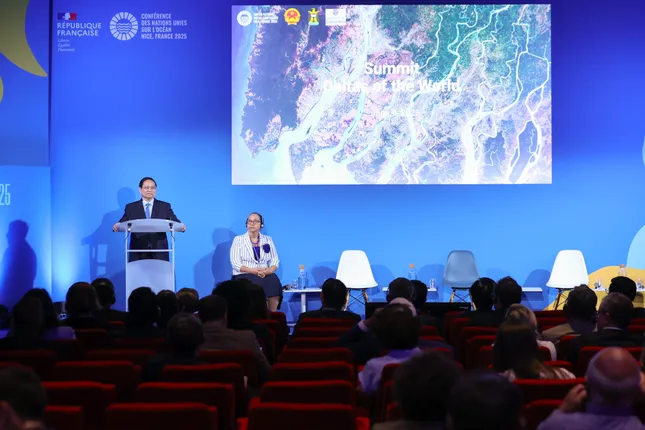
Prime Minister Pham Minh Chinh speaks at the Summit on Deltas for Climate Resilience. Photo: VGP
Global Action is Needed
Sharing Prime Minister Pham Minh Chinh’s viewpoint, President Abdul Latif Rashid of Iraq highlighted the significance of delta regions as the cradle of human civilization and applauded the collective efforts and international cooperation to protect and develop delta regions in response to climate change challenges.
The President of Iraq emphasized the importance of effective water resource-sharing mechanisms between countries and urged immediate action for the sustainable development of river and delta systems before it is too late.
The head of the Colombian delegation, Ambassador Elizabeth Taylor, called for global action based on nature-friendly solutions and the promotion of local community knowledge to develop delta regions. She stressed that restoring mangroves and addressing coastal erosion is about restoring humanity’s memory and protecting the right to life of future generations.
French Foreign Minister Jean-Noel Barrot underscored the importance of the Summit on Deltas for Climate Resilience, stating that protecting delta regions means protecting the oceans.
He shared two key priorities: better management of water areas and stronger efforts to combat climate change. He also called for translating the summit’s outcomes into a driving force for practical actions, in the spirit of international solidarity and for the sake of future generations.
Foreign Minister Jean-Noel Barrot expressed his gratitude to Vietnam, Colombia, and Iraq for co-chairing this meaningful event.
Also on June 9, Prime Minister Pham Minh Chinh delivered a speech on behalf of the 10 ASEAN countries at the UNOC 3 plenary session, sharing Vietnam’s views on the conservation and sustainable use of oceans, seas, and marine resources.
Prime Minister Pham Minh Chinh also held meetings with UN Secretary-General Antonio Guterres, President of the UN General Assembly Philemon Yang, and Vice President of China Han Zheng.
Sustainable Sturgeon Farming: A Successful Model at the Source of Sua Spring
In the face of adversity, a resilient couple, Luong Thi Luc and her husband, hailing from the humble village of Xuan Son, dared to dream. With unwavering determination, they harnessed the pristine natural water sources of Son Dien to cultivate a thriving sturgeon farming enterprise. Their audacity to aspire has not only transformed their own lives but also holds the promise of economic empowerment for their fellow villagers.
400 Volunteers Unite to Clean Up Nghi Son Bay’s Environment
On June 8th, 2025, over 400 enthusiastic volunteers united to clean up the coastal area along Nghi Son Bay in Nghi Son commune. This timely initiative, held in observance of World Environment Day on June 5th, resulted in the collection of approximately 30 tons of garbage as part of the Clean Sea Campaign 2025.
“VPBank Harnesses Opportunities from Resolution 68 with its Advanced Corporate Governance Framework.”
“With Resolution 68 offering immense opportunities for private enterprises, establishing a robust governance foundation has become imperative. In alignment with this direction, VPBank is proud to be ranked among the top 5 enterprises with the highest ACGS evaluation results in Vietnam in 2024, solidifying the bank’s pioneering position in enhancing corporate governance quality.”
A New Era of Ocean Finance: Vietnam Leads the Way in Building a Blue Ocean Ecosystem
Prime Minister Pham Minh Chinh calls for an inclusive and global approach to ocean conservation at the Green Economy and Finance Forum. With a focus on three strategic areas, the Prime Minister proposed a bold vision for Vietnam to lead the way in sustainable blue finance models.

